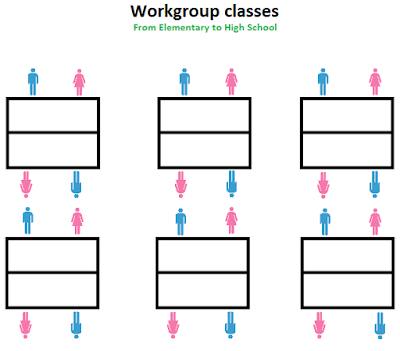Reducing the cost of basic Human Freedom
Have you ever wondered about all the last 100 year developments?
Is life actually getting easier
these days?
Life was certainly no easier 100 years ago
See these women washing and scrubbing clothes for hours?
It look like a war zone of water trenches
They didn't have tap water, it wasn't so long ago...
So what did really bought the freedom you have these days?
Energy + Automation (or optimization) = Freed Time
Freed time from mundane repetitive tasks, mindless boring tasks.
Awareness
Did you ever thought about this subject? Why? Why not?
School indoctrination is itself inefficient and usually procedurally redundant and mechanic. Talking about the subject of "optimization" can be value conflicting.
You aren't there to solve and optimize practical issues.
Why?
Because our schooling system was majorly developed back in the times from the era represented in the picture above. Everything is manual, procedural and obsolete.
Triggering awareness through it's collateral needs
What's the subjective value of time?
For some people "too much" time it's worth their existential boredom while for others it means all the availability they can get to purse their dreams.
Is there something as "too much" time?
If government gave you lifetime access to a certain type of basic income that allows you to pay all your basic bills, but only allowed you to live frugally, what you do?
Imagine you're 20 years old.
You have 8 hours of sleep, 2/3 hours of your basic maintenance tasks, meaning you have left approximately 13 hours per day anything you'd want.
Is there something subjective about "anything you'd want"? Remember you only have a couple hundred dollars/euros to spend each month.
This meaning you can't just run away and just travel all over the world.
Now your left with a lot of time to THINK, time to THINK by yourself, in your own perspective.
According to my calculations most people would self-indulge most of these 13 hours into passive entertainment activities. Basically teenagers and young adults depleting most of this time eating Cheetos, admire their celebrities, browsing social media, watching TV and playing video-games. Most of them will settle... at least before boredom takes them over considering no other labor expectations beyond leaving parent's home or even if most could inherit a family house, this meaning no feelings restraintfulness.
You've created a "Cultural Conflict". Their values were not compatible with this new kind of reality. You thought that if people had more time of their own, society could develop so much more.
I was wrong, it's not that simple. Most society's value aren't designed for this.
If you want to solve this issue you have to create a new kind of generalized Human Programming, this meaning you have you alter their previous experiences, specially educationally driven experiences through a concept I define as Implicit Programming.
Implicit programming defines by the basic rules of causality that a certain crossing or combination of previous experiences triggers the predisposition of another experience to occur.
So in this case, I want (as I wish you'd want to) to reduce the cost of basic Human Freedom.
This meaning we still didn't reach the phase in which governments can pay us all a couple hundred dollars / euros per month while doing "nothing".
So you can divert their interest towards these specific subjects. Obviously you need to design an educational system that cover the basic of concepts demonstrated later below.
You make some of them CARE about real world systems that influence our lifestyle and well-being. You educate and make them think about things that truly matter. You make them interesting people that care about the inner workings of their surroundings. A greater sharing mentality towards societal responsibility and aim for the common good.
So, which are all the basic resource human needs nowadays?
- Water
- Food
- Shelter (Home)
- Energy
- Basic appliances
Reflect a bit on the above and ask yourself, which one would make sense to tackle first?
Subjectively of you firstly choose Shelter and Energy
Reducing Housing costs
- Longevity and Demographics
You want homes to last as long as you can with the least maintenance possible, preferably concrete and brick constructions.
Let's dive into this hypothetical scenario, you live in 2017, by 2050 let's say your country's population decreases significantly. This meaning you've now increased the ratio between Nr. of people / Nr. Homes without any effort because these home were already built by some ancestors this meaning they are PAID. Infrastructurally these buildings were set to last hundreds of years.
Paid, inherited and distributed most commonly from your parents or grand-parents to their children.
As supply decreases prices get lowered unless the market is getting monopolized by renters. For the fair distribution of a basic necessity, you want to avoid this as much you want to disallow it.
So how do you disallow 1st ownership housing leasing?
For the common good you make it leasing illegal, unless you'd only want to lease partially / some individual compartments like bedrooms.
This meaning I can't rent an home entirely if I don't own any registered home in the 1st place OR I can only rent an house legally if that my 2nd home (meaning I'd have to have 1st home registered in the first place).
Credit access would adjust itself to the new requirements.
Fair square, game changer policy.
- Land and construction costs
Why is land so costly? Can't we all live in houses instead of flats?
Well, this isn't a 1st priority demand but it's obviously related.
You can't build or reorganized a city (building and roads) from scratch, so you're always left with the mess (or not) of the previous urban planning.
This is related with the ease of access, in a short example meaning that if you live in a suburb that isn't relatively that close to it's city center but recently got a new metro tunnel reaching it, that area got appreciated. You build better access infrastructure to regions that are farther away's from it's closest city centers. Some examples are high-speed railways, metro system expansion and new better highway routes.
Can you really reduce construction costs? Of course
Is it really worth the effort?
If the population of a settled city is stagnant to very slowly decreasing that may not be the primary issue you should focus on. There are still methods of optimization like mass construction of tall apartment buildings. Or even new technological approaches like 3D concrete printed houses.
Reducing Energy costs
- End User Efficiency
Some examples:
- Replacement of all Incandescent and CFL light bulbs for LED ones
- Usage of photovoltaic panels in houses that have worthy amount of solar exposure, for off the grid power consumption
- Usage of solar thermal panels for water heating
- Analysis of large building infrastructures for energy consumption optimization
- Usage of Lamp Sensors in public building for certain exclusive situation
- General sense of energy saving by turning off devices that aren't being used
- All other power consumption optimizations for specific devices and equipment infrastructures
- Renewable Energy (research matters)
Not excluding end users that don't actually research deeply about Renewable Energy topics, it's always very important to spark youth's curiosity towards this subject. Not just about the deployment of existential technologies, but the interest in it's research and development.
Most of what I should have said here for end users is covered in the previous subtopic.



Comments
Post a Comment